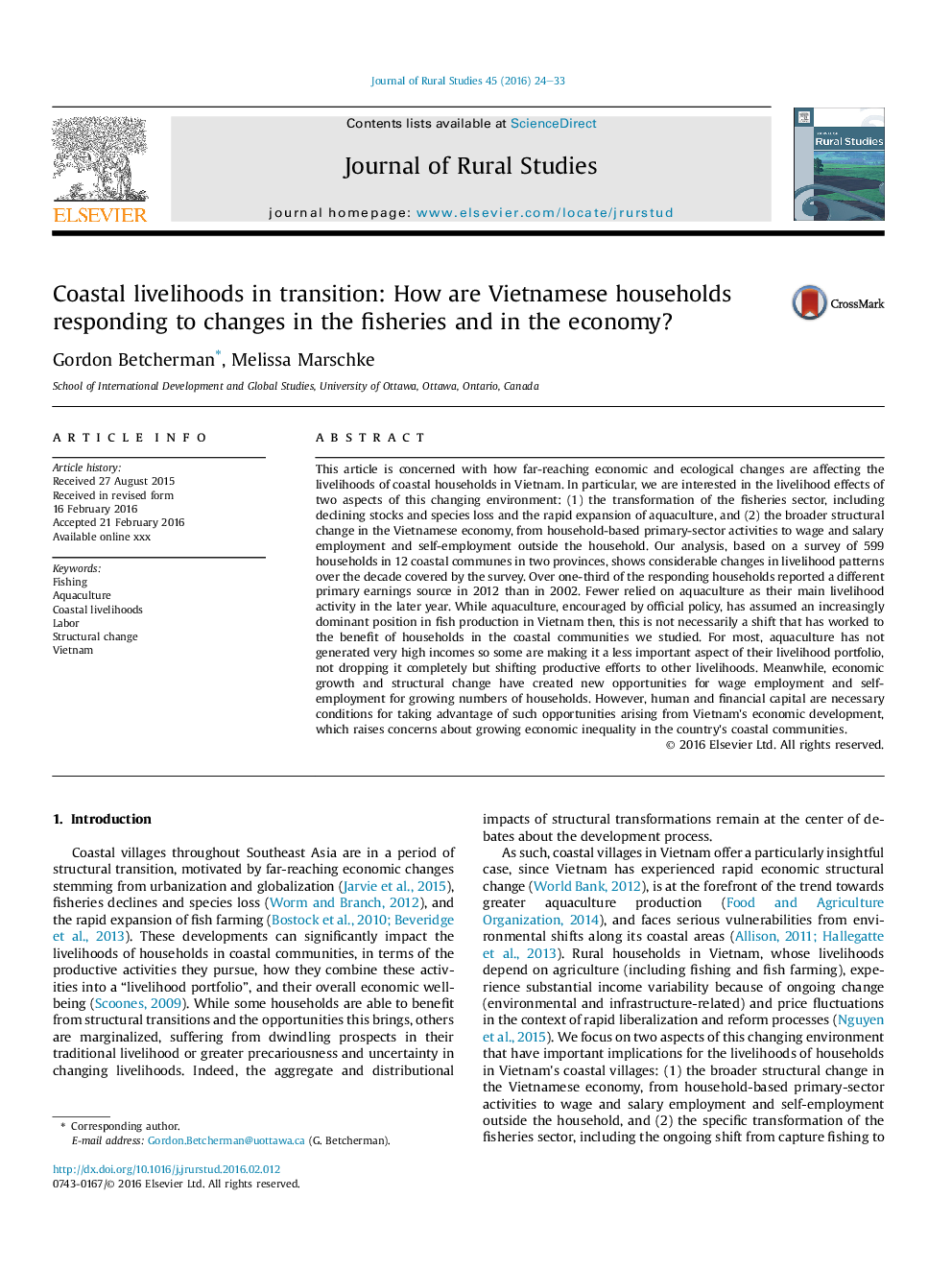| کد مقاله | کد نشریه | سال انتشار | مقاله انگلیسی | نسخه تمام متن |
|---|---|---|---|---|
| 6545399 | 159960 | 2016 | 10 صفحه PDF | دانلود رایگان |
عنوان انگلیسی مقاله ISI
Coastal livelihoods in transition: How are Vietnamese households responding to changes in the fisheries and in the economy?
ترجمه فارسی عنوان
معیشت ساحل در حال گذار: خانوارهای ویتنام چگونه به تغییرات در ماهیگیری و در اقتصاد پاسخ می دهند؟
دانلود مقاله + سفارش ترجمه
دانلود مقاله ISI انگلیسی
رایگان برای ایرانیان
کلمات کلیدی
صید ماهی، آبزی پروری، معیشت ساحلی، کار، تغییر ساختار ویتنام،
ترجمه چکیده
این مقاله در مورد چگونگی تغییرات اقتصادی و زیست محیطی در معرض معیشت خانواده های ساحلی در ویتنام است. به طور خاص، ما به اثرات معیشتی دو جنبه از این محیط در حال تغییر علاقه مند هستیم: (1) تحول بخش شیلات، از جمله کاهش ذخایر و کاهش گونه ها و گسترش سریع آبزی پروری، و (2) تغییر ساختاری وسیع تر در اقتصاد ویتنام، از فعالیت های بخش اصلی مبتنی بر خانوار به دستمزد و دستمزد اشتغال و اشتغال در خارج از خانه. تجزیه و تحلیل ما، بر اساس نظرسنجی از 599 خانوار در 12 کمون ساحلی در دو استان، تغییرات قابل توجهی را در الگوهای معیشت طی دهه تحت پوشش این نظرسنجی نشان می دهد. بیش از یک سوم از خانوارهای پاسخدهنده منبع درآمد اصلی متفاوت در سال 2012 را نسبت به سال 2002 گزارش کرده اند. در سال های بعد، کمتر به فعالیت های حمایتی در زمینه آبزیان پرداختند. در حالی که آبزی پروری که از سوی سیاست رسمی تشویق شده است، در تولید ویتنام به طور فزاینده ای در تولید ماهی در ویتنام پذیرفته شده است، این لزوما تغییری است که به نفع خانوارهای جوامع ساحلی که ما مورد مطالعه قرار داده ایم، کار کرده است. اکثریت، آبزی پروری درآمد بسیار زیادی نداشته است، بعضی ها آن را یک جنبه مهمتر از سبد معیشت خود می دانند، و نه به طور کامل آن را کاهش می دهند، بلکه تلاش های تولیدی را به سوی دیگر معیشت منتقل می کنند. در همین حال، رشد اقتصادی و تغییر ساختاری فرصت های جدیدی را برای اشتغال زایی و اشتغال خود برای افزایش تعداد خانوارها ایجاد کرده است. با این حال، سرمایه انسانی و مالی شرایط لازم برای بهره گیری از چنین فرصت هایی ناشی از توسعه اقتصادی ویتنام است که باعث افزایش نگرانی در مورد افزایش نابرابری اقتصادی در جوامع ساحلی کشور می شود.
موضوعات مرتبط
علوم زیستی و بیوفناوری
علوم کشاورزی و بیولوژیک
جنگلداری
چکیده انگلیسی
This article is concerned with how far-reaching economic and ecological changes are affecting the livelihoods of coastal households in Vietnam. In particular, we are interested in the livelihood effects of two aspects of this changing environment: (1) the transformation of the fisheries sector, including declining stocks and species loss and the rapid expansion of aquaculture, and (2) the broader structural change in the Vietnamese economy, from household-based primary-sector activities to wage and salary employment and self-employment outside the household. Our analysis, based on a survey of 599 households in 12 coastal communes in two provinces, shows considerable changes in livelihood patterns over the decade covered by the survey. Over one-third of the responding households reported a different primary earnings source in 2012 than in 2002. Fewer relied on aquaculture as their main livelihood activity in the later year. While aquaculture, encouraged by official policy, has assumed an increasingly dominant position in fish production in Vietnam then, this is not necessarily a shift that has worked to the benefit of households in the coastal communities we studied. For most, aquaculture has not generated very high incomes so some are making it a less important aspect of their livelihood portfolio, not dropping it completely but shifting productive efforts to other livelihoods. Meanwhile, economic growth and structural change have created new opportunities for wage employment and self-employment for growing numbers of households. However, human and financial capital are necessary conditions for taking advantage of such opportunities arising from Vietnam's economic development, which raises concerns about growing economic inequality in the country's coastal communities.
ناشر
Database: Elsevier - ScienceDirect (ساینس دایرکت)
Journal: Journal of Rural Studies - Volume 45, June 2016, Pages 24-33
Journal: Journal of Rural Studies - Volume 45, June 2016, Pages 24-33
نویسندگان
Gordon Betcherman, Melissa Marschke,
